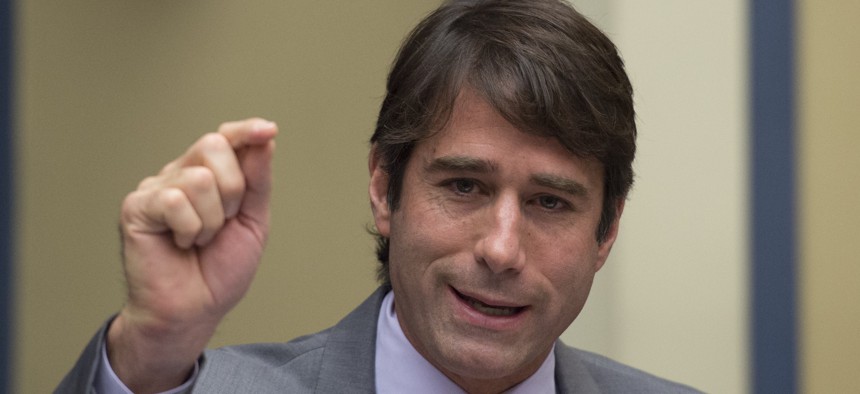House Panel Chairman: Stop the 'Shotgun' Approach to Infrastructure

Rep. Garret Graves, R-La., speaks on Capitol Hill in Washington, Friday, Sept. 9, 2016, during the House Oversight and Government Reform subcommittee on Transportation and Public Assets hearing on FEMA's response to the flooding in Baton Rouge La. AP Photo/Molly Riley

Connecting state and local government leaders
U.S. Rep. Garret Graves, who leads a House infrastructure subcommittee, explained to Route Fifty why he's not quite ready to talk about raising new revenues for public works.
WASHINGTON — Before any debate in Congress takes place about raising new money for public works projects, U.S. Rep. Garret Graves would like lawmakers to take a couple of other steps.
The Louisiana Republican, who chairs the House Transportation and Infrastructure subcommittee on water resources and the environment, told Route Fifty earlier this week that it would be "ignorant" to talk about added infrastructure revenue without first improving the systems used to develop and deliver projects.
Additionally, he'd like to see an inventory of infrastructure programs spread across the federal bureaucracy, a look at their costs and benefits and the national mission they're advancing, and a process to reprioritize and reallocate existing funds.
"Instead of trying to take this shotgun approach, and throwing a nickel at every $10 problem across the country, I think what makes more sense is: let's prioritize what the federal government's true infrastructure objectives are and then invest money in those things," Graves said during an interview outside the U.S. Capitol.
"Be a reliable federal partner," he added. "And go ahead and tell the states, say, 'look, in five years, we are no longer going to do x, y and z.'"
Graves, whose district encompasses an area around Baton Rouge, won a second term in 2016 and is up for re-election in November.
Previously, he served as Louisiana's chair of the Coastal Protection and Restoration Authority, which oversees the development and implementation of plans to restore coastline and combat flooding.
He says he recognizes certain transportation and "resiliency" infrastructure could use more money. And he says there's a "merit-worthy" debate to be had about indexing the gas tax (currently, the tax does not automatically go up to account for inflation).
"In some cases, if you make the right principled investments, you actually save money," he said. But Graves added: "I think that there's a lot more money that's on the table than people realize today and we have not done a good job really utilizing some of those investments."
President Trump put forward an infrastructure blueprint last month that calls for $200 billion of federal spending, mostly on new grant programs. It also includes a raft of proposals aimed at speeding up project permitting and approvals. The White House plan has sparked conversation about infrastructure on Capitol Hill.
But committees in the House and Senate have yet to roll out any legislation for a major infrastructure package, and key lawmakers have not coalesced around options for how to pay for new spending on roads, railways, water systems and other public works.
House Speaker Paul Ryan on Wednesday effectively declared dead any House effort to raise the gas tax this year during a "tele-town hall" with the conservative group Americans for Prosperity.
This despite endorsements for raising the tax from Trump and House Transportation and Infrastructure Chairman Bill Shuster.
Looking beyond funding and Trump's plan, Graves backed an idea Shuster raised this week to move the Army Corps of Engineers civil works division out of the Defense Department.
Shuster said that, 200 years ago, the Army might have been the only arm of the federal government that could build a dam or road project. "Today, there's no need for civil works to remain at DOD," he added. Shuster said his preference would be to move the civil works component of the Corps to the U.S. Department of Transportation.
Graves said his "two cents" would be to pull together stakeholders and experts who can help come up with a transition plan, which might involve moving different parts of the agency to different places. "This can't be a priority within Department of Defense," he said of the Corps' work, "and it needs to be in an agency where it can be a priority."
Bill Lucia is a Senior Reporter for Government Executive's Route Fifty and is based in Washington, D.C.

NEXT STORY: DOD developing in-house cloud provisioning system





